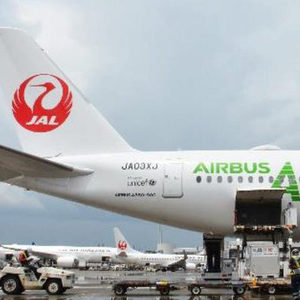Velocys technology powers first commercial flight

June 21, 2021
BY Velocys
Velocys plc, the sustainable fuels technology company, is pleased to announce that sustainable aviation fuel (SAF) produced by the company’s proprietary technology using woody biomass residue feedstock has been used in a commercial flight by Japan Airlines.
Japan Airlines flight (JAL #515) from Tokyo to Sapporo was completed on June 17.
This important milestone follows on from the collaboration agreement signed with Toyo Engineering Corp. to commence the development of Toyo’s commercial projects to produce SAF and other renewable fuels in Japan using Velocys micro-channel FT technology.
Advertisement
The flight is the first commercial flight in the world to use SAF derived from gasified wood-chips synthesized into aviation fuel. The fuel was produced in a Velocys FT reactor from the hydrogen and carbon gases generated by the gasification of the wood-chips at the demonstration plant in Nagoya in 2020. This facility produced 2,366L of neat aviation fuel blendstock which was tested to ensure that it met the required international standard, ASTM D7566 Annex1. SAF that meets this specification can be blended into conventional jet fuel at any ratio from a small fraction up to 50 percemt.
Henrik Wareborn, CEO of Velocys, said, “Velocys is pleased to announce the validation of SAF derived from woody biomass as evidenced by the use of 25 percent SAF blend in this first in the world commercial flight using wood-chips derived jet fuel.
“SAF synthesized with the Velocys FT technology from gasified forestry residue has a 70 percet lower carbon intensity than conventional fossil jet fuel. In addition, FT-SAF offers significant additional air quality improvements thanks to 90 percent lower particulate emissions, 99 percent lower sulphur emissions and lower nitrogen oxide emissions than conventional fossil fuels.”
Advertisement
Haruo Nagamatsu, CEO of TOYO, said, “The Velocys technology demonstrated high efficiency and stable performance at the NEDO pilot plant, and contributed to the production of high-quality SAF, green naphtha and green diesel.”
Related Stories
Metro Ports on April 8 announced significant environmental milestone in its voluntary efforts to reduce greenhouse gas emissions. By switching to renewable diesel, the organization reduced its carbon emissions by 85%.
CoBank latest quarterly research report highlights current challenges facing the biobased diesel industry. The report cites policy uncertainty and trade disruptions due to tariff disputes as factors impacting biofuel producers.
The U.S. EIA on April 15 released its Annual Energy Outlook 2025, which includes energy trend projections through 2050. The U.S. DOE, however, is cautioning that the forecasts do not reflect the Trump administration’s energy policy changes.
The Michigan Advanced Biofuels Coalition and Green Marine are partnering to accelerating adoption of sustainable biofuels to improve air quality and reduce GHG emissions in Michigan and across the Great Lakes and St. Lawrence Seaway.
EIA reduces production forecasts for biobased diesel, increases forecast for other fuels, including SAF
The U.S. Energy Information Administration reduced its 2025 forecasts for renewable diesel and biodiesel in its latest Short-Term Energy Outlook, released April 10. The outlook for “other biofuel” production, which includes SAF, was raised.
Upcoming Events










